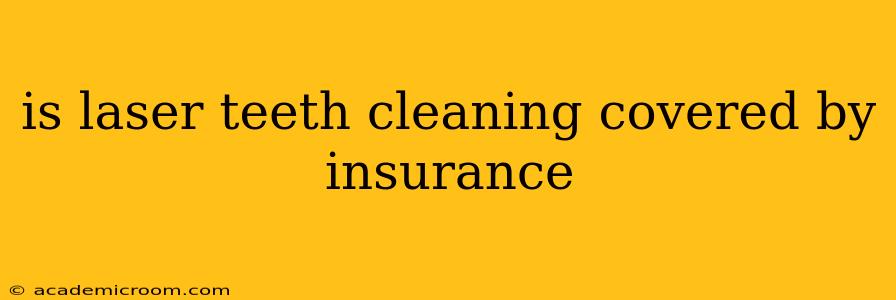Laser teeth cleaning, also known as laser scaling and root planing, is a modern dental procedure offering several advantages over traditional methods. However, a common question patients have is whether their insurance covers this advanced technique. The short answer is: it depends. Coverage varies significantly depending on your specific insurance plan, your provider's participation in your network, and the specifics of your dental needs.
What is Laser Teeth Cleaning?
Before diving into insurance coverage, let's understand what laser teeth cleaning entails. This procedure uses a laser to remove plaque and tartar buildup from teeth and below the gumline. This targeted approach can be particularly beneficial for individuals with periodontal disease (gum disease) or those who experience sensitivity with traditional scaling and root planing. The laser's precision minimizes discomfort and bleeding, leading to a quicker healing process for many patients.
Does My Insurance Cover Laser Teeth Cleaning?
This is the crucial question, and unfortunately, there's no single definitive answer. Insurance companies classify dental procedures using specific codes. While traditional scaling and root planing are generally covered (at least partially) by most dental insurance plans, the codes for laser procedures might be considered "cosmetic" or "experimental" by some insurers. This means they may not be covered, or only covered partially, or perhaps only covered if medically necessary, meaning your dentist must provide extensive documentation that traditional methods are not viable.
Here’s what you need to do:
- Check your policy: The first step is to carefully review your dental insurance policy. Look for specific language regarding periodontal treatments and any exclusions related to laser technology.
- Contact your insurance provider: Call your insurance company directly to inquire about coverage for laser teeth cleaning. Provide them with the specific procedure code your dentist uses. Having this information is crucial for a clear answer.
- Ask your dentist: Your dentist is your best resource. They can check your insurance benefits and explain whether your plan covers the procedure or if they can provide pre-authorization. They may also be able to discuss alternative treatment options covered by your insurance if laser cleaning isn't covered.
What Factors Influence Insurance Coverage?
Several factors influence whether your insurance will cover laser teeth cleaning:
- Type of insurance plan: PPO plans generally offer broader coverage than HMOs. However, even within PPOs, coverage can vary widely.
- Specific policy details: Your individual policy dictates which procedures are covered and to what extent.
- Medical necessity: If the laser treatment is considered medically necessary for addressing a specific condition like advanced gum disease, insurance is more likely to cover it.
- Network participation: If your dentist isn't in your insurance network, you may face higher out-of-pocket expenses, even if the procedure itself is technically covered.
What if Laser Teeth Cleaning Isn't Covered?
If your insurance doesn't cover laser teeth cleaning, several options are available:
- Traditional scaling and root planing: This is the standard method, and your insurance is likely to cover it at least partially.
- Payment plans: Many dental practices offer flexible payment plans to help manage the costs of non-covered procedures.
- Savings plans: Consider dental savings plans that can help lower the overall expense.
Is Laser Teeth Cleaning More Expensive Than Traditional Methods?
Yes, laser teeth cleaning is typically more expensive than traditional scaling and root planing. The higher cost is due to the specialized equipment and training required for the procedure.
What are the Benefits of Laser Teeth Cleaning?
While cost is a factor, it's important to weigh the potential benefits. These include:
- Reduced discomfort and bleeding: The laser's precision often leads to a more comfortable experience with less post-procedure sensitivity.
- Faster healing time: Many patients report quicker healing compared to traditional methods.
- Improved precision: The laser targets plaque and tartar more precisely, potentially leading to more effective cleaning.
In summary, whether or not your insurance covers laser teeth cleaning is highly dependent on your specific plan and circumstances. Always contact your insurance provider and your dentist to determine your coverage and explore your options. Remember to discuss the benefits and potential costs with your dentist to make an informed decision about the best treatment for your oral health.
